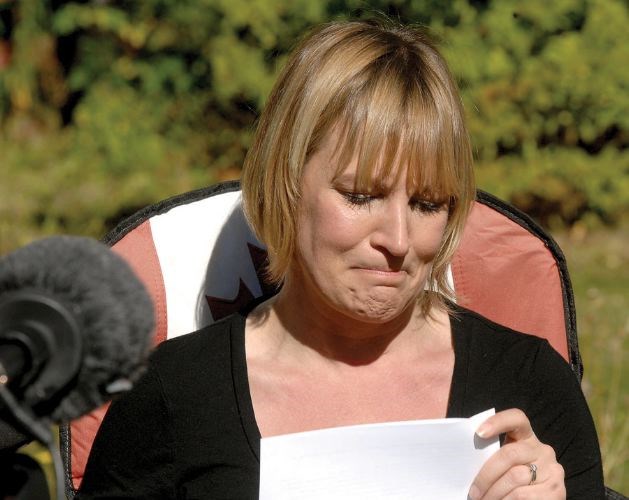The RCMP may have been cleared of criminal wrongdoing in the shooting death of Greg Matters last September, but his sister says many serious questions still need to be answered.
Speaking to media following the release of the Independent Investigation Office's report on Wednesday, Tracey Matters questioned "the urgent and the aggressive deployment of an emergency response team to a simple domestic dispute."
The incident began during the early morning of Sept. 9, 2012 when an off-duty RCMP officer called 911 after seeing a vehicle collision and a dispute between Greg Matters and his brother.
Roughly 30 hours later, Greg had been shot dead on the family's Pinko Road property. A 15-year veteran of the Canadian military, Greg, 40, was being treated for post-traumatic stress disorder in the months leading up to his death.
Tracey called the police account of events "confused" and noted a "clear absence of an arrest warrant." And she alleged police refused to allow her brother's psychiatrist, mother and a neighbour to talk to him.
Tracey also said their mother, Lorraine Matters, was "seriously assaulted" by an RCMP emergency response team member when she appeared at the scene.
According to a statement also provided to the media, police gave Lorraine , who is in her 60s, permission to meet with her son but when she appeared at the driveway where Greg was located, an ERT member roughed her up.
The member pointed what appeared to be a machine gun at her, forced her hands up "causing her pain and bruising," then grabbed her jacket and ripped her shirt.
"She fell to the ground and was dragged by the officer along the road," Tracey said in the statement. "As she tried to get up, the officer kneed her in the chest and threatened to knee her again if she tried to move."
Lorraine was handcuffed and taken to the RCMP detachment, strip searched and told she was being charged with assault but was not allowed to make any phone calls, according to Tracey.
"She was still in custody when she was informed that Greg had been shot dead," Tracey said. "The assault charges were never pursued."
As for Dr. Greg Passey, the psychiatrist who had been treating Greg for 18 months, Tracey said RCMP contacted him shortly before Greg was shot. Passey offered to fly up to Prince George from Vancouver to speak to Greg and "walk him out" but the phone call ended abruptly and Passey assumed he was "no longer required."
Passey also noted that since then, there have been two similar incidents that were "resolved without incident because the RCMP allowed clinicians to speak with the veterans."
According to the IIO's findings, Greg was shot twice after an attempt to subdue him with a stun gun had failed. Greg had turned towards the officer who had deployed the stun gun and raised the hatchet he was carrying when another officer, convinced his colleague was in danger, pulled the trigger.
"Our belief is this never should have happened and it never should have escalated to the degree that it did," Tracey said during the media conference.
The B.C. Civil Liberties Association echoed Tracey's concerns on the RCMP's handling of the incident.
"All of the surrounding circumstances of this case demand urgent investigation to determine the appropriateness and competence of the RCMP in this matter and whether this tragedy could have been avoided," BCCLA Micheal Vonn spokeswoman said in a statement.
IIO chief civilian director Richard Rosenthal stressed in his report that his mandate was limited to determining whether a criminal offence was committed in police involved deaths and serious injuries and that the IIO's file will be forwarded to the RCMP and the Public Complaints Commission.
RCMP Public Complaints Commission interim chair Ian McPhail said Wednesday he will look at whether the RCMP's response was in accordance with "all appropriate training, policies, procedures, guidelines and statutory requirements" and whether those policies were adequate."
North District RCMP Chief Superintendent Rod Booth said in a statement the police will "fully cooperate" with the Public Complaints Commission's investigation.
The B.C. Coroners Service will also be stepping up its own inquiry into how police handled the incident.
Coroners spokeswoman Barbara McLintock said a special investigations coroner has been assigned to the case and it's a strong possibility an inquest will be held.
"We don't want to absolutely guarantee it yet, but it's very likely this will in fact go to inquest," McLintock said. "Given the information in the Rosenthal report, there are probably still issues to be explored as well as some family concerns which Mr. Rosenthal noted."
In an inquest, a jury hears evidence related to a death in order to make recommendations to prevent similar events in the future.



